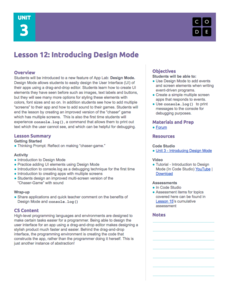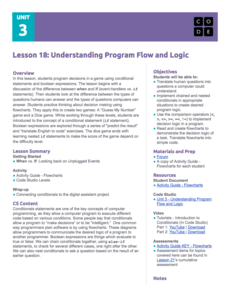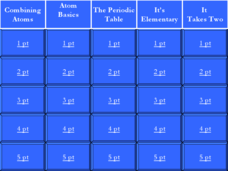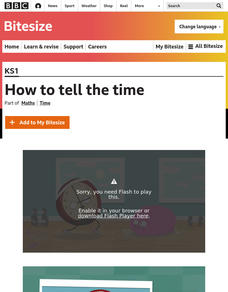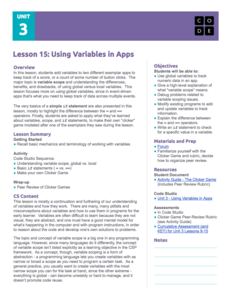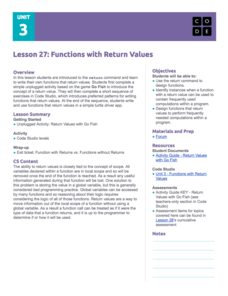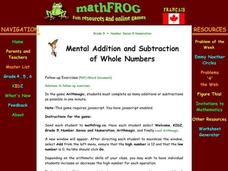Curated OER
Stabilization Wedges Game
Teamwork and critical thinking combine to for a creative lesson on reducing greenhouse gas emissions. Ebullient environmental studies learners play a game in which they strategize how to place colorful energy wedges together to create a...
Code.org
Star Wars: Building a Galaxy with Code
Welcome to the code side. The interactive lesson introduces coding in a game format with familiar characters. Young computer experts learn to develop code to control the interaction of the characters in the game. The activity ends with...
Curated OER
Equivalent Fraction Dice Game
Young scholars play a fraction dice game to familiarize themselves with equivalent fractions. In this fraction lesson, students work with a partner to play the game and young scholars write a reflection to conclude the...
Code.org
Introducing Design Mode
Move beyond buttons when designing user interfaces. In the fourth installment of a 21-part unit, young computer scientists learn to apply design mode, which gives users options for colors, fonts, etc. They learn to incorporate these...
Code.org
Beyond Buttons Towards Apps
Explore how people use event-driven programming in games with a lesson plan that teaches scholars to use new screen elements and events. They apply these new elements to create a simple chaser game.
Curated OER
Leftovers
Math games build and enforce division skills in a fun environment. The students play a game in which tiles are divided by the number rolled on a die and "leftovers" are kept by the first player. In each turn, the players record division...
Code.org
Understanding Program Flow and Logic
Explore decision-making logic in programming computer games. The 10th installment of a 21-part unit teaches scholars how to apply conditional statements and Boolean expressions. They use these concepts to create a "Guess My Number" game...
California Academy of Science
Natural Resources Bingo
Bingo isn't just a silly game, it's a great way to practice all types of skills. After reviewing that the earth is composed of natural resources, what those natural resources are, and sustainability, the class plays a game of bingo. The...
Code.org
Events Unplugged
Introduce event-driven programming. Young computer scientists learn the meaning of event-driven programming and how it is different from previous styles of programming. They play a card game to simulate the challenges that occur in this...
Curated OER
Go Bug!
Second graders explore the lives of insects by participating in a card game. In this metamorphosis lesson, 2nd graders define several scientific vocabulary terms associated with insects and identify the different life cycles associated...
Curated OER
Jeopardy
Students participate in games to review subject matter. They drill on vocabulary and/or spelling words. Students connect pertinent facts with dates. They perform activities as a group review before a test.
Microsoft
Arrays
Zoos are just elaborate arrays. Scholars learn the meaning of arrays and how to create them in Minecraft. Applying this knowledge, they write a program to create a zoo within the game's world. They also complete an independent project...
Curated OER
Giving Game-Put It on the Card!
Students explore credit cards and how they are used in purchasing goods and services. They participate in a game called the Giving Game.
Curated OER
Multiplication by 10
Learners practice their multiplication skills by playing a game. They play the online interactive game Powerama 5M where they multiply numbers by 10, 100, 1000 and 10 000. Afterward, they complete a paper based worksheet for assessment.
Curated OER
Giving Game--Planning to Make The World
Students, in groups, examine plans to make the world a beter place. They evaluate the plans based on feasibility, practicality, and do-ability by students their own age.
Curated OER
Energy Jeopardy
While science Jeopardy games are a dime-a-dozen, this one has some pretty unique categories that are still relevant to a middle school physical science curriculum. The topics include: leading nations, famous Americans (who invented...
Curated OER
Telling Time
First graders play a fun game while learning to tell time. This BBC site is well designed. They enjoy it while learning a lot. Playing in pairs would be lots of fun.
Curated OER
Rock, Paper, Scissors to One Whole
Pupils explore fractions by participating in a chance game. In this denominators lesson, students collaborate with a partner to record the outcome of several games of rock, scissors, paper. Pupils translate the results of the games into...
Curated OER
Giving Game-Let the Games Begin!
Young scholars discuss games in which there is a "winner."
Code.org
Using Variables in Apps
Investigate the benefits of using global variables. The seventh installment of a 21-part unit continues the study of variables from the previous lesson. Young computer scientists modify two existing apps by adding variables and learn how...
Code.org
Functions with Return Values
Young computer scientists explore how to use the return command in computer programing by playing Go Fish. They learn about functions that return values and then write a turtle driver app using the return function.
Curated OER
Mental Addition and Subtraction
Students play the online game ArithmAttack to practice mental math skills. They play the game to as many additions or subtractions as possible in sixty seconds. Afterward, they complete a paper based follow up exercise.
Curated OER
Mental Multiplication and Division
Students practice multiplication and division problems using mental math. They play the online game ArithmAttack to complete as many multiplications or divisions as possible in 60 seconds. Afterward, they complete a paper based follow up...
Curated OER
Variety of Fractions
Students play a fraction game. In this improper and mixed fractions lesson, students discuss the fractions 1/3, 4/3 and 1 1/3. Students learn about the differences between proper fractions, improper fractions and mixed...



